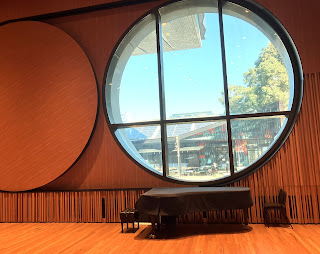It is
exciting to now be hosting a joint doctoral dissertation seminar through the GAME research group, with participants from several countries and regions: China, Japan, Hong Kong, Spain, Denmark, Faroe Islands, Norway, and Uganda.
Here is our seminar schedule for 16 April 2025:
Presenter and Respondent; Presentation Title
Sherry Qiaoyue Liu (respondent, Dr. David
G. Hebert)
Impact of Participating in a Community Choir on
Adults in Shenzhen, China
Flora Jinhan Wei (respondent, Dr. James
Isabirye)
Pre-Service Music Teachers in
Mainland China: A Mixed-Method Research
Kristian Tverli Iversen (respondent, Dr. Yuki
Morijiri)
Research Design for a Study of AI in
Music Education
SHORT BREAK
Elizabeth Anne Oltedal (respondent, Dr. Yuki Morijiri)
Conviction and compromise: An exploratory study
of social moderation in the assessment of music performance
Marianne
Løkke Jakobsen (respondent, Dr. Luna Ning
Luo)
A Study of Interactions and Learning
Experiences in the Cross-Cultural Virtual Learning Space: Case Studies of Instrumental Music Education
between Denmark and China
Kay Wing-Ki Li (respondent, Dr. David
G. Hebert)
Cultural Differences in
Metacognitive Teaching: A Study of Instrumental Music
Learning in Hong Kong
SHORT BREAK
Erisa Walubo (respondent, Dr. Luna
Ning Luo)
Decolonising Ugandan Primary Music Teacher
Education through exploration of Indigenous practices of Amayebe musical
tradition
Sergio Garcia-Cuesta (respondent, Dr. James
Isabirye)
Citizens Are/As Artists: An
integrative approach to music education
Knut Eysturstein (respondent, Dr. Milton
Wabyona)
Tracing Faroese Music Heritage in Education:
Archival and Interview-Based Approaches
David G. Hebert: Concluding Remarks



.jpg)

.jpg)







_(3470673354).jpg)






















.JPEG)

_(cropped).jpg)



.jpg)























